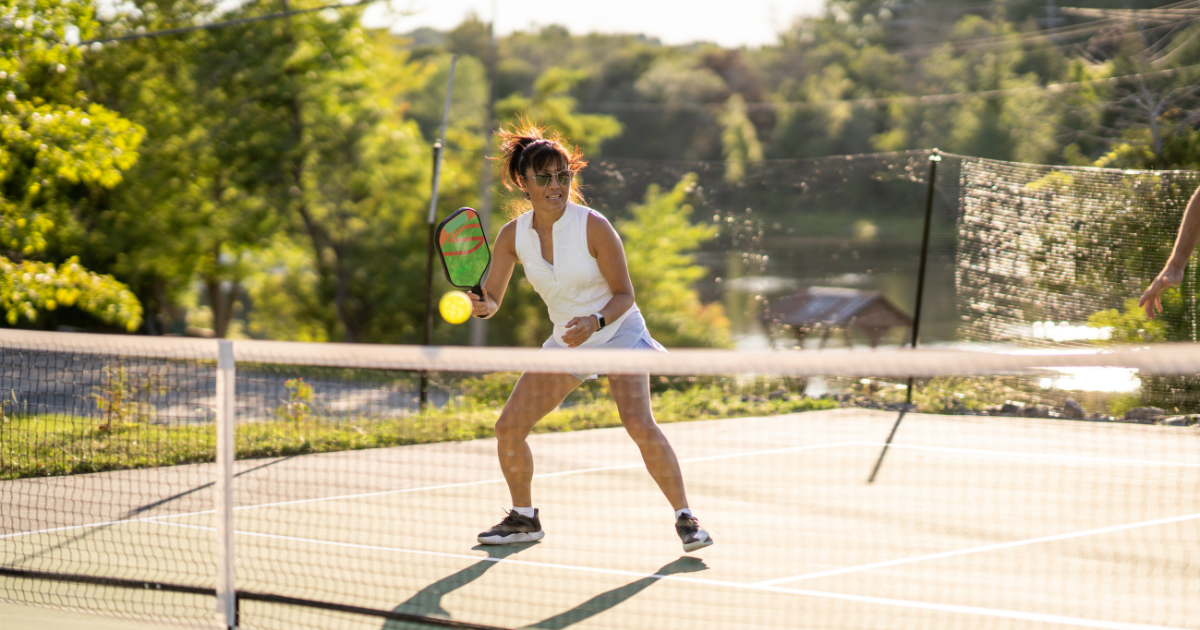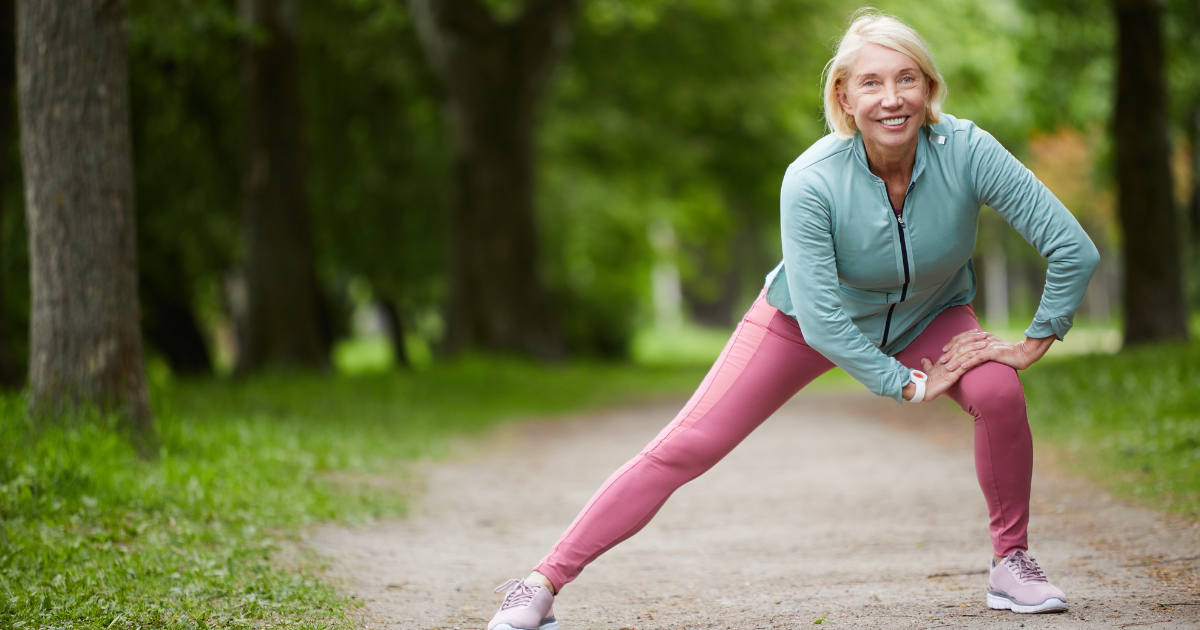How to Set Pickleball Intentions That Actually Stick
Resolutions are rigid. Intentions are flexible. If you’re tired of setting goals that implode by February, this mindset shift is your next best shot. Here’s how to create pickleball intentions that build confidence, consistency, and long-term growth—without the pressure.
Why Skipping Your Warm-Up in Winter Is Costing You Points (Not Just Causing Injuries)
When the temperature drops, many pickleball players skip their warm-up and jump straight into play. Cold muscles slow reaction time, reduce stability, and cost you points. A short, dynamic warm-up can improve performance and lower injury risk all winter long.
How Women Are Rethinking Pickleball Performance in 2026
More women are rethinking what high performance in pickleball actually looks like. Instead of grinding harder, they’re prioritizing intention, recovery, confidence, and sustainability to play better and stay on the court longer.
Why Women Who Play Pickleball Regularly Feel Better Mentally
For many women, mental health improves when they carve out something that’s just theirs. Pickleball offers a rare mix of movement, focus, and connection that fits into busy lives, making it easier to stay consistent and feel better mentally over time.
Why Pickleball Makes You Feel So Good: The Dopamine Effect Explained
Pickleball has a way of cutting through noise when nothing else does. You don’t need to force yourself into a better mood or talk yourself into enjoying it. You just play, and somehow you leave feeling lighter than when you arrived—and there’s real brain science behind why that happens.
Strong Foundations: Building Lower-Body Power for Pickleball
Strong legs do more than keep you steady—they’re the source of every quick pivot, sprint, and powerful shot. This guide breaks down how women can build lower-body power (with or without a gym) to improve speed, stability, and endurance on the pickleball court.
Pickleball Injuries on the Rise: What the Data Says and How to Stay Healthy
Pickleball’s boom has brought a surge in injuries—ER visits tied to the sport jumped nearly 20x in less than a decade. From fractures and sprains to the rise of eye injuries, here’s what the latest data shows—and how you can stay healthy and on the court.
Pickleball Training and Your Menstrual Cycle: What Women Should Know
Discover how the menstrual cycle can impact energy, endurance, and recovery—and how female pickleball players can adapt training, play, nutrition, and recovery to get the most out of every match. Learn from champion Anna Leigh Waters and expert tips to plan around your body’s natural rhythms.
Can I Balance My Pickleball Addiction? It’s a Must…Or Else!
Pickleball is addictive — but is it taking over your life? Learn how to balance your passion for the game with family, relationships, and real-world responsibilities without losing what matters most.
Pickleball Injury Prevention Tips Every Woman Should Know
Pickleball is exploding in popularity—and so are the injuries. Women face a unique set of risks on the court, from fractures to tendon strains, but most are preventable. Here’s how smart warm-ups, targeted strength work, the right shoes, and recovery routines can keep you playing strong for years.
Hydration Tips for Playing Pickleball in Cooler Weather
Cooler temps don’t mean you can slack on hydration. Dehydration can sneak up fast in fall and winter play, zapping your energy and slowing your reactions. Here’s how to spot the signs and keep your water (and electrolytes) in check so you can stay sharp on the court.
Your Pickleball Cross-Training Plan: Build Mobility, Strength & Resilience
Pickleball demands quick feet and sharp reactions—but stiff hips or weak joints can cut your game short. This cross-training plan blends yoga, strength, and balance work to keep you mobile, powerful, and injury-resilient on the court.
Finding Relief On and Off the Court: Why the TheraICE Headache Relief Hat is a Game-Changer for Migraine Sufferers
Migraines can sideline more than just your pickleball game—they can take over your entire day. The TheraICE Headache Relief Hat offers cooling, compression, and light-blocking relief that actually works. Here’s why this simple, portable tool has become a must-have for managing migraines and getting back to life on and off the court.
Post-Pickleball Recovery Tips to be Ready for Your Next Match
Pickleball is fun until you wake up sore the next morning. A simple recovery routine—cooling down, hydrating, stretching, and adding light movement—can keep your body fresh and ready for your next match. Here’s a realistic plan that fits even the busiest schedule.
Protein-Rich Snacks That Actually Help You Bounce Back
Played hard? Refuel smarter. These protein-rich snacks balance recovery, energy, and taste—without fussy prep or mystery powders.
What to Eat Between Pickleball Matches for Sustained Energy
Tournament days are long — but the right snacks, timing, and hydration keep your energy steady. Here’s exactly what to eat between pickleball matches.
Why Repetitive Drills Build Smarter, Stronger Pickleball Players
The newest paddle won’t fix old habits — but repetition will. These three pickleball drills build smarter decisions, steadier mechanics, and calmer hands under pressure, all in just 20 minutes.
3 Dynamic Warm-Ups You’ll Actually Do (And Feel) Before Pickleball
Skip the yoga pretzels. These 3 dynamic warm-ups are quick, simple, and tailored for pickleball so you start sharper and finish stronger.
Tried It, Loved It: Mental Game Tools for Pickleball Players (That Aren’t Apps)
Your mental game matters just as much as your paddle or your shots. From journals and routines to recovery habits, digital aids, and community support, these are the mental tools pickleball players actually use — and love — to stay steady when the game gets tough.
Playing Pickleball Over 50? Here's How to Support Your Joints & Energy
Pickleball after 50 doesn’t have to mean slowing down. With the right fuel, fitness habits, and recovery, senior players can keep their game strong, prevent injuries, and enjoy every point. Instructor Bob Savar shares smart strategies for staying safe, social, and competitive on the court.





















